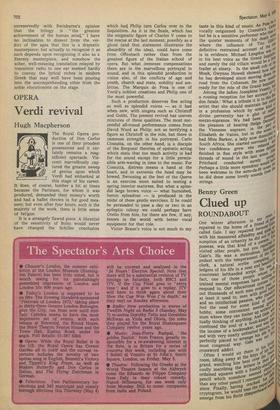OPERA
Verdi revival
Hugh Macpherson
The Royal Opera production of Don Carlos is one of their proudest possessions and it certainly remains a magnificent spectacle. Visconti marvellously captured the greater sweep of genius upon which Verdi had embarked at this stage of his career. It does, of course, lumber a bit at times because the Parisians, for whom it was produced, demanded their money's worth and had a ballet thrown in for good measure; but even after four hours, such is the majesty of the work, there is little sense of fatigue.
It is a strangely flawed piece. A librettist of the sensitivity of Boito would never have changed the Schiller conclusion which had Philip turn Carlos over to the Inquisition. As it is the finale, which has the enigmatic figure of Charles V come to the rescue at the last moment, possibly as a ghost (and that statement illustrates the absurdity of the idea), could have come from Offenbach rather than from the greatest figure of the Italian school of opera. But what immense compensations there are in the marvellous portrayal in sound, and in this splendid production in vision also, of the conflicts of age and youth, church and state, nobility and ambition. The Marquis de Posa is one of Verdi's noblest creations and Philip one of the most powerful.
Such a production deserves fine acting as well as splendid voices — as it had when new, with singers such as Christoff and Gobbi, The present revival has uneven mixtures of these qualities. The most successful all-round performance comes from David Ward as Philip: not as terrifying a figure as Christoff in the role, but there is immense strength in his portrayal. Carlo Cossutta, on the other hand, is a disciple of the Bergonzi theories of operatic acting which state that too much activity is bad for the sound except for a little permissible arm-waving in time to the music. For Cossutta, distress means a hand at the heart, and in extremis the head may be bowed. Swooning at the feet of the Que.') is an exercise more suited to testing a spring interior mattress. But what a splendid large brown voice — what burnished, heroic splendour — is produced in the midst of these gentle exercises. If he could be persuaded to pass a day or two in an epileptic colony we could perhaps have Otello from him, for there are few, if any, tenors in the world with better vocal equipment for that role.
Victor Braun's voice is not much to my taste in this kind of music. As Posallfejois5 vocally outgunned by Cossutta's C but e'do ut he is a sensitive performer who fise'ma the quieter moments of hisdeath 5heb'i,s where the influence of Tito Gi"role definitive restrained account of the i "rat s in evidence. Michael Langdon loLitor in his best voice as the Grand Ingil'i",:trie and surely the old villain would b f e a ;"ille railer at ninety. In the small role of Monk, Gwynne Howell showed ho" °rile he has developed since moving d°wds road from the Coliseum. He new tot ready for the role of the Grand Diclu-bad Among the ladies Josephine VeaseY'1i0 a rousing reception for her account Cfot don fatale.' What a tribute it is to thietatut artist that she should maintain in a profession which by some fiperb divine perversity has a glut of 'ff,e4 mezzo-sopranos. We had been Pr°-eseli, the pleasure of hearing Flelga Derlirt 0f the Viennese soprano, in the 10 t Elisabeth de Valois, but in the 6°,11010 had Miss Barker, a lady now doinicibut at South Africa. She started nervoualYed her confidence grew she relax tote finished in fine style with stave !jolt° threads of sound in the last seeg-rod. Pritchard conducted surely cid l'evei Perhaps a little more spendourvoll4e been welcome in the auto-da-fe tile he did draw some lovely sounds tr" strings.










































 Previous page
Previous page